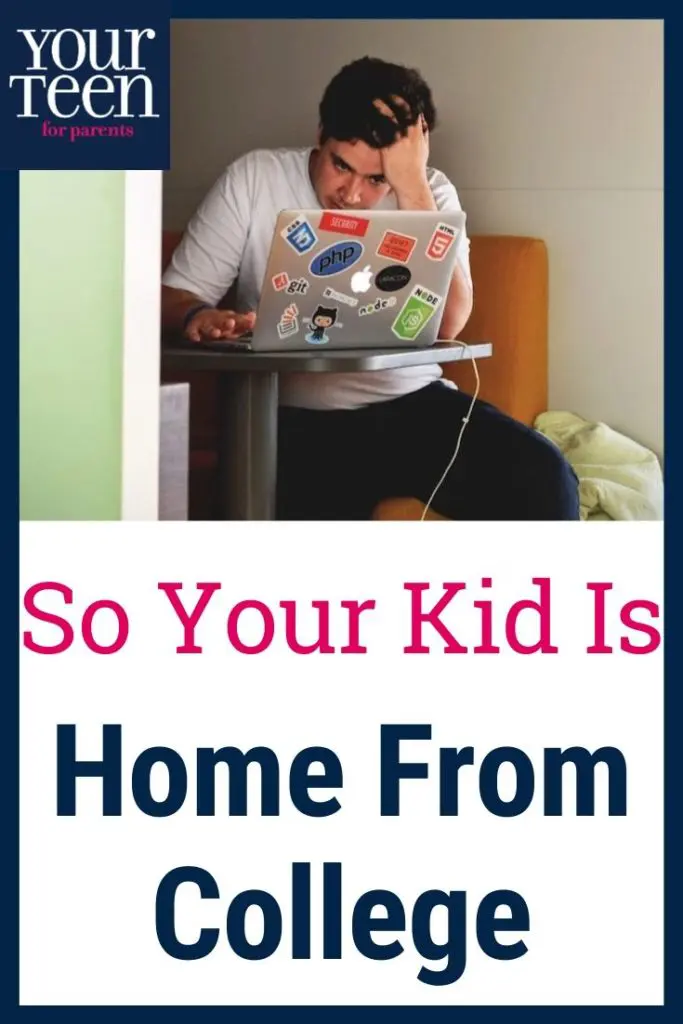You may have received an eerily quiet phone call recently from your adult child at college, saying that their school is closing, and they are forced to come home. Problem is, they don’t want to come home. Most students enjoy the freedom and stimulation of college life. They are delighted to come and go when and where they please. No one tracks them, tells them to do chores, or nags about homework. They have been able to reinvent themselves and make friends and connections with a clean slate.
| [adrotate banner=”169″] |
As much as we love our adult children, we don’t want them home either. All week, we have been meeting with clients who are filled with dread, concern, and anxiety. Their newly arrived college student doesn’t seem interested in the online classes they are meant to be taking. They balk at the request to empty the dishwasher.
Social distancing seems absurd to some young adults—they feel invincible. They are secretive and coming home much later than their high school days. When asked about their whereabouts, they bristle and seem shocked you would even be interested, let alone ask. They’re adults now. Who do we think we are?!
Their outbursts at the injustice, the constricting rules of home, their pesky younger siblings, and the devastation of having their lives uprooted feels melodramatic and a tad overdone. Yet, they have a point.
How can parents help?
How to Help Your College Kid Adjust to Home
Listen
Don’t minimize their disappointment, even if it sounds overstated or selfish. They need to get it out, and our nods and attention help more than you know.
Give them time to adjust
Their response to the situation will change over time. The grief cycle is different for everyone and cannot be rushed. Feeling anger is appropriate and is better expressed than repressed. Remind yourself that this is a temporary period.
Help them find words
When we feel overwhelmed or emotional, our brains don’t function as well. We can struggle to find the right words to express our feelings or may not even be able to identify them. Parents can often find words easier and it can be powerful. Help them out by naming their feelings: “You must be so disappointed,” “This really isn’t fair. I don’t blame you for being angry/frustrated/down,” “It must be depressing to sit in your old bedroom,” or “It must be awful to feel like your life is going backwards just when you started loving it.”
See it as an opportunity to reconnect with your ADULT
Your child is different now than when they first left for college. They have grown and changed. We need to respect the changes and learn about them in new ways. How? By asking questions, and refraining from judgment or critical comments, even when what they share is frightening or shocking. This might very well be the last time they live at home for an extended period of time. How do you want them to remember it?
Praise them
Yes, they are adults, but who doesn’t want acknowledgement and validation? We all need it. They deserve it. They got themselves home and are adjusting, whether they like it or not. When we acknowledge the positives, they are more likely to continue the positive behavior. Some studies suggest we get better behavior by make five positive statements for every negative comment. This is harder than it sounds, but boy does it help!

Our college kids have worked hard to get to college, to survive the changes and challenges of an environment away from home. They’ve forged friendships, bonded over bizarre professors, crazy parties, heartache, and even homesickness. They are not only disappointed; they are at risk of depressive and anxious symptoms. They are experiencing a loss and will need to grieve. The good news is that it won’t last forever. And we have it within our power to help them find a way to accept the situation and make the most of it.





